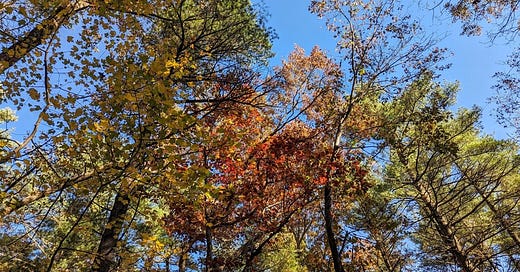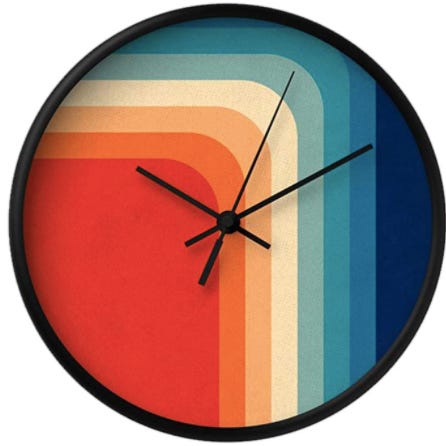Growing older is not necessarily a bad thing. So why do we talk about age so negatively?
I’m 33 years old, so I’m not terribly qualified to speak on this topic yet. But I’m blessed to be in community with some wonderful people who are older than I am.
A loved one and newsletter reader shared with me that she, as a self-described old person, feels uncomfortable when people call her “young lady.” I was surprised to hear this experience. People are really calling older women “young lady”? But yes, apparently, pretty often strangers say “here you go, young lady” or similar when holding the door open, or when calling the next person to the checkout line or bank counter or at the dentist office or any of these other places where we have to exist in public.
From my own perspective, it makes me uncomfortable when people call me “young lady.” It feels condescending and not very accurate. It reminds me of the sort of thing you might read about in historical fiction: wealthy men trying to marry their daughters off to gain power and privilege. Ugh.
Then, on top of that, calling someone “young” when they clearly aren’t is disrespectful. You don’t have to call them “old” either. Unless someone invites you to comment on their age (by asking, how old do you think I am, etc), it’s really none of your business.
Why is calling an old person “young” disrespectful? It’s implying being old is a problem, or like it’s better to pretend no one ever gets old.
Growing old is relative. In my first sport, women’s gymnastics, you are old at age twenty. Some athletic ambitions are only possible when you’re young. However, aikido, the martial art I practice, supports some of the oldest practitioners of any sport.
Sensei, who has been teaching his students Kokikai Aikido in the US, and internationally in Japan and Australia for over fifty years, talks about what aikido was like in his body over the decades. “Fifties, sixties—still growing. Getting better. Seventies—even better.” he explained to a room full of students at camp. “Eighties…ehh,” he said with a wry smile and a shrug of his hand. I had tears in my eyes because no one had said to me before, you can be interested, happy, healthy, social, and still growing into your body in your sixties, seventies, and eighties. Something to look forward to, if I get there.
We all change as we get older, in different ways, perhaps so gradually you don’t even notice.
I called an old friend on her 80th birthday and asked her, “how does it feel to be 80?” She replied, “well, about the same!”
In aikido, and in life, I respect when people have been working on something for a long time. I’m not going to devalue that by joking about them being a young person. We’re all getting older together, and I believe that’s easier if people can honestly share how that goes.
For more experiences of what it’s like to get older at any age or gender, I recommend checking out Sari Botton’s Oldster Magazine on Substack, featuring fascinating interviews with a wide variety of people:
Thanks so much for reading!
Do you need digital marketing assistance? I can help with graphics, websites, search, newsletters, videos, and more. Learn more and book a free discovery call at weshineconsulting.com!
Check out my videos! YouTube • TikTok • Instagram • Facebook
Take care,
Rey










Thanks so much for this! I am old enough now (early 60s) that I am perceived as an "old" person, or a "senior citizen" by people who don't know me. I've been called "young lady" a few times, and it's obvious that the speaker has good intentions and believes they are being kind, but it definitely carries that connotation that they are giving me permission to pretend I'm not old, because it's such a sad, horrible thing to be. What's interesting to me is that I never got called "young lady" when I was younger, even though I identified back then as a cis woman. My appearance was what was referred to back in those days as "androgynous," and I was once in a while called "sir" by people who, on closer look would suddenly get embarrassed and say something like "I mean ma'am. I'm so sorry." It's weird how people get those initial first cultural clues, because even when I wore the official "baby dyke" uniform, I had big breasts, which I neither flaunted nor hid. Now that I'm old (which to some extent, tends to erase gender in many people's impression), I get called "ma'am" (or "young lady") way more than when I was younger. I think maybe one reason the "young lady" thing is common is because the person saying it is not only trying to compliment you by pretending you don't look "old," they are also trying to reassure you that even though you're old, you are still a "lady." For people still subscribed to the myth of binary gender, this is, I believe, intended as a way of telling you that you are still recognizable as the gender you are assumed to be and value being. I feel like a living experiment about how cultural socialization leads people to perceive and interact with strangers.
I definitely see your point about age. I feel a similar way when someone calls me big guy. I'm thinking....but I'm not big.